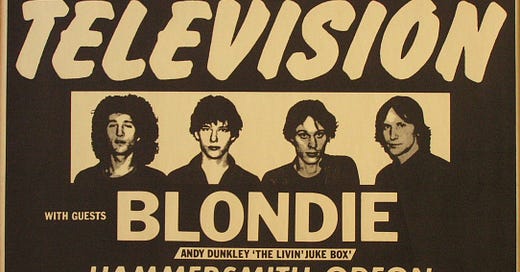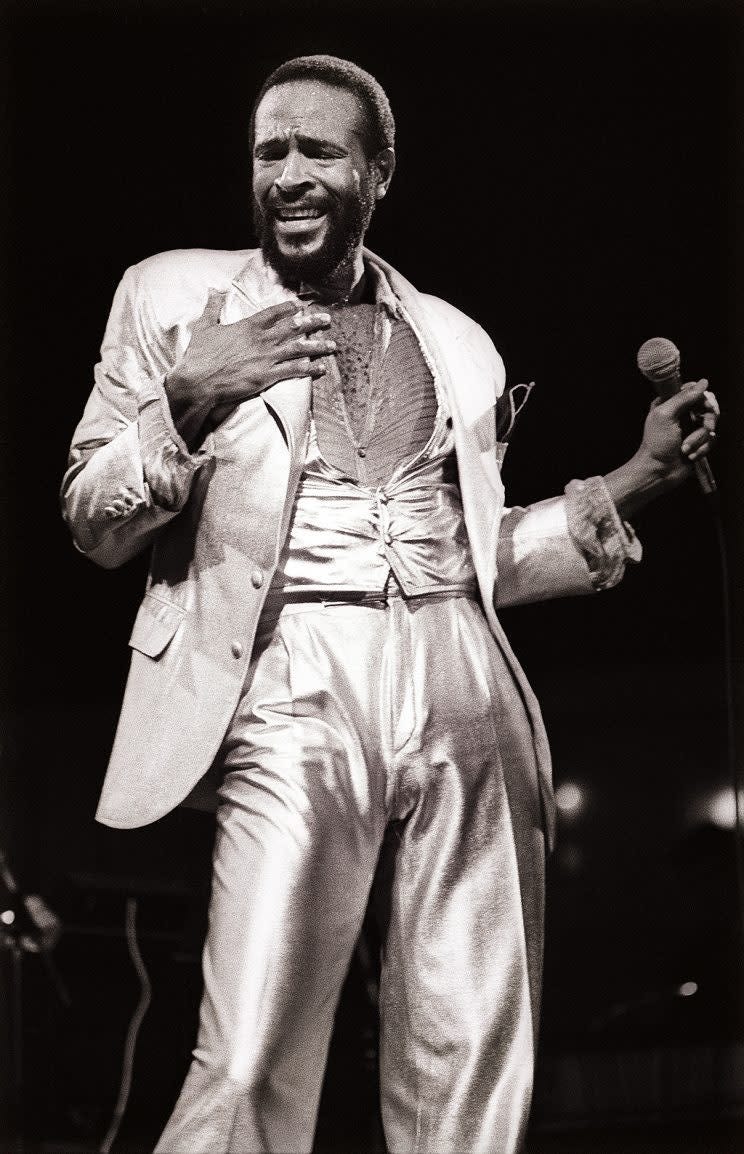Semantic Origami, part the second: a true Historie of Musicke in the 1980s (pt 1)
He was there, you can be sure of that. If ever a crusty old sea-dog knew the ropes, this was the one. As music critics go, he was a one-man boarding party and he knew what he was worth, for all time …
Television / Blondie, Hammersmith Odeon, May 1977
Everyone knows now, don’t they, that the decade we call ‘The Sixties’ began in 1963, with the assassination of Kennedy and the release of the Beatles’ first LP. Similarly, ‘The Seventies’ began in 1972, when Bowie did “Starman” on Top of the Pops and my guinea pig died. And yet, entirely in keeping with its pushy nature, the decade usually called ‘The Eighties’ actually got there early: May 28 1977. I was present of course, up in the fourth row of the balcony, quietly pulling the strings of history.
I jest, of course. I was not pulling strings. I was mostly trying to dodge the laser-like reflection that proceeded from the polished scratchplate of Tom Verlaine’s Fender far away on the stage below, which kept fingering me in the eyeball. As fingers go, it was an unusually pointy one of very bright, white, intense light and no matter where I put my head, the damn thing found me out in the darkness, like a supertrooper finds a beetle in a basement barrel of bitumen at the bitching hour of… uh, bidnight. It was as if Tom Verlaine somehow knew that I was to be the witness chosen to watch the Grail pass through the Chapel Perilous of Rock to the cusp/threshold of its next era. The one they call The Eighties.
But why in 1977, and why me?
1977 was of course the year of the dear old Queen’s Silver Jubilee — reason enough, you’d think, for such a symbolically loaded event to take place in Hammersmith. But no, there was more to it than that; more in the air generally speaking.
You see, 1977 was the unholy year of punk, when the punks broke out of Bromley and, in a rash move that surely sealed their fate, got everywhere. It was awful. An infestation. I used to find punks behind the skirting board in the larder and, worst of all, in my pants drawer. What chance anarchy’s fomentation in there, eh chaps? So the punks failed and anarchy would never be king, which left the field open to post-punks and new wavers, who were bouncy right enough, but basically never stood a chance in the coming joint reign of the King of Pop, Michael Jackson, and the King of Dads, Bruce Springsteen. For a while everything felt a bit William and Mary.
But let’s get back to the year in question.
Television vs Blondie was the absolute heavyweight face-off of the time. It was the confrontation that everyone knew was going to define the coming era of cultural conflict: the epoch of the Eighties when everything was bright and shiny and superficial but fun, or dull and inward-looking and self-pitying and glum. You know the equation: awful pop vs indie shit.
And let me tell you, Television played a blinder that night, and not only by nearly blinding me. They were incredibly dull and introverted and diffidently offhand and played like it, which everyone seemed to enjoy, whereas Blondie were fun and superficial and frivolous and fuckable and Debbie did high kicks over the heads of the front row that were almost as good as Van Morrison’s ones in The Last Waltz, which we’d all seen the year before and rather felt that the future of rock was surely now a thing of the past.
“Eh?” I hear you say. “Do what?” Well, it’s quite tricky to get your head round it now, so concentrate. Basically, we all thought the past was going to be the future last year, in 1976, and now, in 1977, the future is all of a sudden going to be Debbie Harry in thigh-high jackboots stomping on the faces of sexist rock fans, forever.
It was a big night, I can tell you. And I was there and you weren’t.
Marvin Gaye, Manchester Apollo, 1980
I loved Marvin. No, I really did. Furthermore, I knew back then in 1980 that What’s Goin’ On was not his best album, not by a long chalk, even though everyone else thought it was. And I was incredibly excited by the thought that I might be going to see my Innerworld Guy singing his tragic heart out, a heart destroyed by the custody battle that had exposed his heartbreak for all to hear on the recent heart-rending and slightly embarrassing album, Here, My Dear, which is far and away his best, incidentally — though I was the only person who thought so at the time. What do they say about prophets in their own doodahs?
Anyway, I went to see him at Manchester Apollo with my girlfriend, expecting to witness forensic searches of his ventricles for all to see, pivoted on a monster groove, plus singing you’d struggle to believe was humanly possible, so vast was its circumference and richness in emotional detail. And lo… There was no singing in it worth a pfennig (he had spent much time recently in Belgium) and he even retained
the same pathetic slow-motion striptease routine that he’d been doing for donkeys’ years, which even he looked embarrassed by. It remains the most depressed I’ve ever been after a gig. So awful was it that I found it necessary to apologise to my girlfriend, in case she chucked me punitively.
Like a div, I went and saw Marvin again in London the following year, hoping for redemption, and he was even worse. What do they say about dogs and the scenes of their crimes?
Next thing we knew… No, no, let’s not even.
Bruce Springsteen, Manchester Apollo, 1981
Oh Lord. Well, I may as well bite the bullet. Get it over with. You can’t really do the Eighties without doing Bruce Springsteen, can you? He was one of the Big Four which held pop’s centre ground aka Poisoned Chalice (or Grail) up above the reaching hands of the pop-ulace (see what I did there?), so that the Grail/Chalice would remain out of reach of people who once liked Rod Stewart.
Springsteen was the yeoman’s Grail-Bearer. The dude. The guvnor. The man in charge of everything. And the white working class at last had someone who really talked down to them in a way they enjoy, with a sort of mock-hesitant, nervously laughing, grinny but super-inarticulate parody of working-class good-blokey bollocks and who then worked his “ass off” so that people with blue collars could identify with him and his working-class rock commitment to the ennoblement of work and a work-orientated lifestyle — which he enjoyed collectively in a big house with his subordinate gang of working-class-ish musical navvies.
I went to see The Springsteen Show, which was suitably enough at Manc Apollo, and it really did last seven hours. I kid you not. Since proper unionisation, that’s longer than the average working man’s day shift and, in Springsteen’s managerial hands, it was a clean, heroic, fun and smiley-gaspy modest seven-hour shift — to show just how hard The Man in Charge worked to manoeuvre his “ass” into the “off” position.
Clean. Heroic. Fun. Smiley-gaspy… These are not words that appear in my lexicon of rock, as a rule. I like a bit of brooding sexuality and transgression, if I’m honest, and the language that goes with it, like “gimp”. And a drummer who swings. But as a musical theatricalisation of an elevated dadly vision of rock’s high purpose, Springsteen was pretty hard to beat.
“Like, uh… heheheh … y’know… (gasp, smile) … Oh, uh…[scratches nape] Uh… Did anyone see where I put my ‘ass’?”




